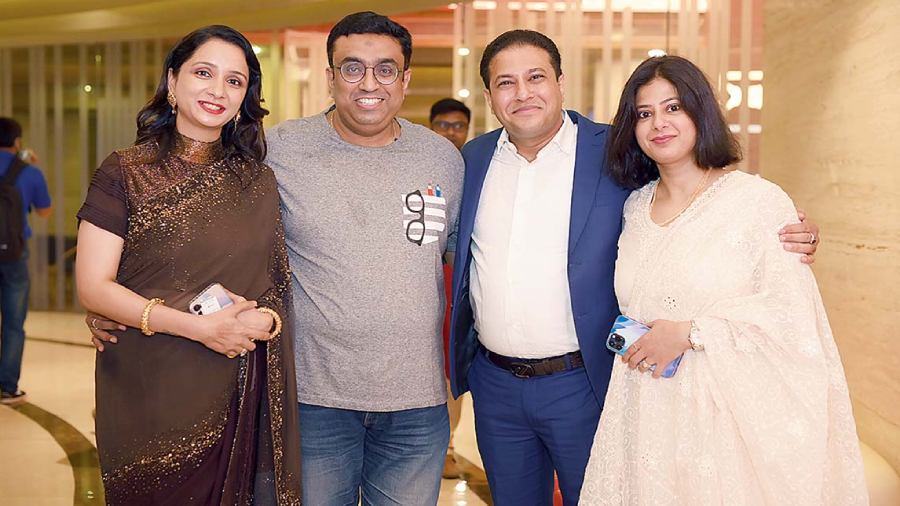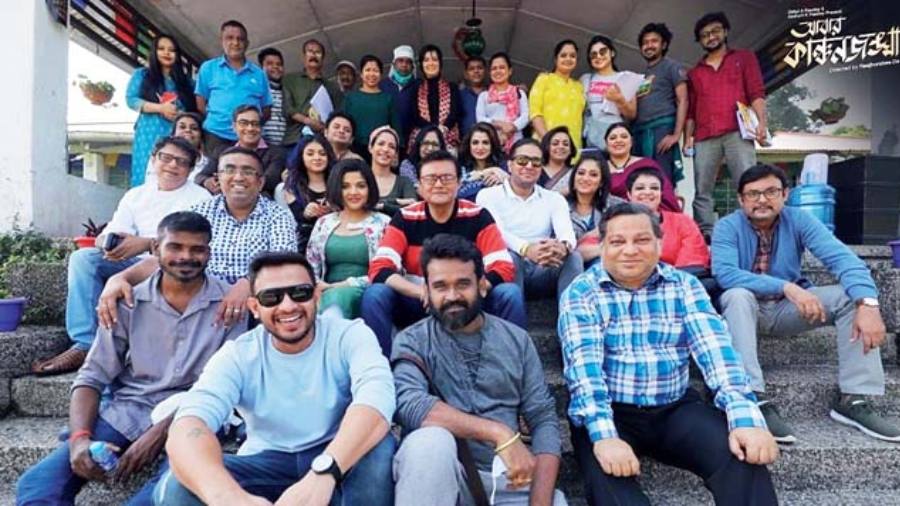Nostalgia wrapped around the festival of Christmas, Santa’s magic and the hope for a miracle got the Deb family together in director Raajhorshee De’s family drama Abbar Kanchanjangha that released at the theatres on April 1. The Akshatt K Pandey and Shilpi A Pandey produced film progresses with the right balance of suspense and humour as the story unfolds and the shades of each character get revealed. Nature gets beautifully captured all throughout the film, and Kanchenjunga acts as a silent observer to the drama that unfolds and wraps itself with an emotional twist at the end. As the film runs successfully at the theatres in its opening week, The Telegraph caught up with director Raajhorshee De to know more that went into the making of it.
What is the genesis of the story of Abbar Kanchanjangha ?
Call it a clan, a network, a tribe, or a family — whatever you call it, whoever you are, you need one. Families are messy. Sometimes the best we can do is to remind each other that we are related for better or for worse and try to keep the maiming and killing to a minimum. Families are the compass that guides us. They are the inspiration to reach great heights, and our comfort when we occasionally falter.This is what Abbar Kanchanjangha is all about.
It’s your tribute to Ray. How has Ray inspired you as a filmmaker?
Anyone who touches upon the art of Satyajit Ray often faces dim criticism, if not harsh. It’s like cooking a dish from your mom’s recipe. You will never be able to match up to the original taste. So, we never had the intention of remaking or recreating or making a sequel of the Ray film. Abbar Kanchanjangha is completely an original story. It has no connection or similarity with the original story except for the fact that in my film it’s a family who visits Darjeeling. It is a tribute to 100 years of Ray.
How did you decide on the cast?
While scripting, Padmanabha, who wrote the screenplay and dialogue discussed the cast with me. Few cast members were fixed from day one and few we had to change. But I guess, this is finally one of the best casts one can think of.

During our shoot, nature really surprised us. It was unbelievable that we saw a glimpse of Kanchenjunga while going towards Murti river. No pollution, and the colour of sky was magical. All of us felt very liberated and that reflected on every performance —Raajhorshee de
Every character in the film is so well-represented in the script. Was it a challenge while scripting or directing the story to represent 17 cast members in a justified manner?
Getting 17 actors together in three long scenes, which were shot on three consecutive nights was not easy, but DOP Gopi Bhagat made it so smooth that it did not feel like a hurdle.
The cinematography looks beautiful. How did you decide the look and feel of the film?
We did a location recce before the shoot . We had fixed all the locations. Literature on the relationship between cinema and tourism suggests that a destination’s depiction on motion pictures is often positively related to its tourist arrivals. Darjeeling and North Bengal are so.
The film had a long outdoor schedule during pandemic. What kind of challenges did you face and what worked in your favour for the making?
We had the recce before the first lockdown happened. When the first lockdown happened, we did not know when it will be over and was very anxious. Finally, after the first lockdown got over we went to shoot. The biggest hurdle was to make sure that all crew and cast members are safe and vaccinated, with their tests done. But during our shoot, nature really surprised us. It was unbelievable that we saw a glimpse of Kanchenjunga while going towards Murti river. No pollution, and the colour of sky was magical. All of us felt very liberated and that reflected on every performance.
Right from the beginning the film creates suspense by talking about a miracle. Everybody in the film looks forward to the miracle. However the film is quite a tear-jerker in the end. Could it not have a happy ending for all? Did you have alternative thoughts in mind?
I was deeply inspired by Bratya Basu’s philosophy in one of his plays called Krishnagawabhar (The Black Hole ). There the protagonist wrote a suicide note reading which changed my life forever. I was reading what Karl Heisenberg mentioned in his autobiography about a sunrise he had witnessed... in that unprecedented morning of magnificence, when he confronted the momentum of this ultimate reality of life, he felt its certainty and constancy. Yet he went on his theoretical principle of uncertainty.This was my take on the magic and miracle in the film, which is like an eternal debate between certainty and uncertainty.
Kanchenjunga is beautifully captured in the film. How did this mesmerising beauty inspire your story or storytelling?
The mountain holds an important place in the mythology and religious ritual of the local inhabitants . So, Kanchenjunga in the film is like the alter ego of all the characters in the film. It acts as the subconscious of all the characters, like sometimes clouded, sometimes clearly visible.
How many times did you visit Darjeeling for this film?
I have visited it three times before shooting the film.
You have been working in the film industry in various roles for the past 15 years. Would you consider this film to be a turning point ?
I never thought that I will make films or will be a filmmaker. I wanted to explore something that is beyond the comfort zone of a monthly salary. I would definitely consider this film as a turning point.
You had told one of your crew members that even if this is your last film as a filmmaker, you would have no regret. Do you feel the same after making it? As a creative person aren’t you craving to create more after the appreciation that this film brought you?
I feel I got the best team for this film. Be it cast, crew and the producers. In climbing a mountain, good climbing is about climbing with heart and with instinct, not ambition and pride.
What’s next in the pipeline? Is there a particular genre you want to explore as a director?
I want to tell stories about women. Over the last few decades, perhaps in an effort to denote our social progressiveness, hundreds of films have been dubbed “feminist”. Nothing is more inspiring than a well-made film to uplift and empower women all around the world. Strong and inspiring female leads, a storyline that perfectly captures the struggles of women and an inspiring fight against all odds to rise to the challenge is the perfect recipe for a genuine women empowerment movie. I will keep doing that for all my next projects.
Pictures: Sourced from Raajhorshee De
